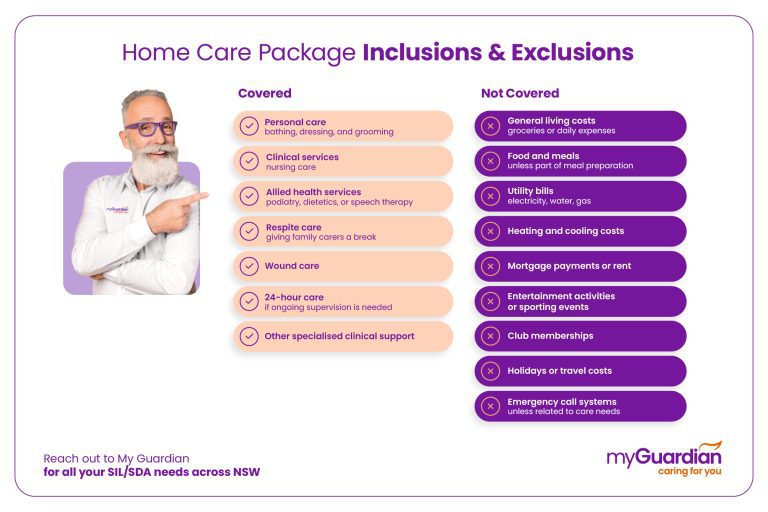How to select the right home care providers for your NDIS needs
How to select the right home care providers for your NDIS needs
Blog Article
Everything About Home Care Providers for Individuals With Disabilities: NDIS Registered Assistance
Home care solutions under the NDIS play a crucial role in supporting people with specials needs. These services are created to improve day-to-day living with customized aid, varying from personal care to movement support. Recognizing just how to browse these options can be complex. This review explores the various facets of NDIS home care, from offered services to the selection of companies, highlighting necessary considerations for those looking for assistance. The journey towards encouraged care starts below.
Comprehending the NDIS and Its Objective
The National Disability Insurance Policy Plan (NDIS) acts as a transformative framework designed to give assistance and solutions for people with specials needs. Established to boost the quality of life and warranty fair access to important sources, the NDIS equips participants by supplying customized plans customized to their unique demands. It aims to promote freedom, making it possible for individuals to seek their personal goals and aspirations.Through a structured strategy, the NDIS allocates funding for various assistances, including education, work aid, and community participation. This all-encompassing scheme not only focuses on immediate treatment however also emphasizes long-term developing outcomes. By advertising option and control, the NDIS motivates participants to choose their recommended solution providers, ensuring that care straightens with their values and choices. Inevitably, the NDIS represents a substantial dedication to enhancing the lives of people with handicaps, cultivating inclusivity, and developing a much more helpful society.
Kinds Of Home Care Provider Available
Various types of home treatment services accommodate individuals with impairments, mostly concentrating on personal care assistance and break treatment alternatives. Personal care support supplies essential assistance with everyday activities, while break care supplies momentary relief for main caregivers. Understanding these services is essential for ensuring the wellness of both individuals with impairments and their households.
Personal Treatment Support
While maneuvering day-to-day life can provide obstacles for people with impairments, individual treatment help offers crucial support tailored to their one-of-a-kind needs. This sort of home treatment solution includes a variety of tasks created to advertise self-reliance and boost top quality of life. Individual care aides assist with everyday jobs such as showering, dressing, brushing, and toileting, making sure individuals maintain individual health and comfort. They might likewise aid with meal prep work, medicine administration, and movement support. By giving customized treatment, these professionals equip people to engage even more fully in their social activities and daily routines. Generally, individual treatment help plays a substantial duty in cultivating self-respect and autonomy for those with specials needs, allowing them to prosper in their home environment.

Reprieve Treatment Options
Respite treatment functions as a vital resource for families and caretakers of people with impairments, giving short-term remedy for the needs of daily caregiving. This kind of solution can take numerous types, including in-home break care, where qualified professionals see the home to assist with treatment jobs. Additionally, family members might decide for facility-based reprieve treatment, where individuals obtain care in a customized setting, enabling caregivers to relax. Furthermore, some organizations use emergency break solutions for unanticipated circumstances. These options not just aid reduce caretaker stress and anxiety however likewise promote the health of people with handicaps by providing them new experiences and social communication. In general, break treatment plays a critical role in supporting both caretakers and those they care for.

Exactly How to Access NDIS Home Treatment Solutions
Accessing NDIS home treatment services includes comprehending the eligibility standards stated by the National Disability Insurance Policy Plan. People have to navigate a structured application process to secure the essential assistance customized to their needs. This area will certainly clear up both the qualification requirements and the actions involved in obtaining services.
Qualification Criteria Described
To get approved for NDIS home treatment services, people need to meet details qualification requirements that analyze their requirements and circumstances. Candidates have to be matured in between 7 and 65 years and have a considerable and permanent disability that influences their ability to carry out day-to-day tasks. In addition, they have to be an Australian person, an irreversible resident, or hold a Protected Unique Category Visa. The NDIS needs evidence of the disability, generally via clinical analyses or reports. In addition, people ought to demonstrate that they call for assistance to join economic and social life. These standards assure that solutions are directed in the direction of those who truly require support, advertising self-reliance and enhanced high quality of life for individuals with impairments.
Application Refine Steps
Can I Select My Own Support Workers With NDIS?
The private made inquiries whether they can choose their own support employees under the NDIS structure. Generally, individuals have the adaptability to pick support employees, cultivating individualized care that lines up with their details requirements and preferences.
What Occurs if My Needs Change After Getting Support?
They need to connect these changes to their solution copyright if a person's demands modification after getting assistance. Modifications can be made to the treatment strategy, making certain that the assistance remains reliable and pertinent for their situations.

Exist Limits on The Number Of Hours of Care I Can Get?
The individual asked regarding possible limitations on the number of care hours received. Typically, such limits might exist based upon specific policies or funding setups, emphasizing the significance of assessing arrangements and standards consistently.
Can I Use NDIS Funding for Home Modifications?
The question of utilizing funding for home modifications occurs regularly. Usually, individuals may make use of NDIS funding for essential alterations to their homes, making certain accessibility and safety and security, section upon meeting details eligibility criteria and guidelines.
Exactly how Do I Take care of Issues Regarding My Home Treatment Solutions?
To attend to grievances concerning home care solutions, people ought to first document their problems. They can interact straight with their service company, looking for resolution, or rise the concern to relevant oversight bodies if needed. Home treatment solutions under the NDIS play a critical role in supporting individuals with impairments. Different types of home treatment solutions cater to people with impairments, largely concentrating on personal treatment aid and respite treatment alternatives. support at home. Individual care support offers crucial assistance with daily activities, while break care offers short-term relief for primary caretakers. Family members might decide for facility-based reprieve care, where individuals obtain treatment in a specialized setting, enabling caretakers to take a break. How can family members successfully handle the economic elements of home treatment services for individuals with specials needs?
Report this page